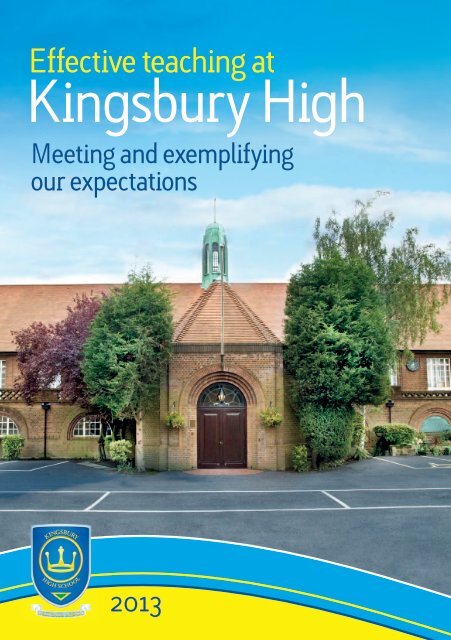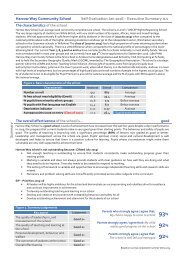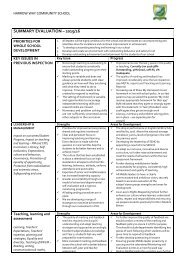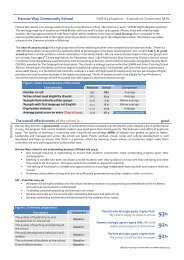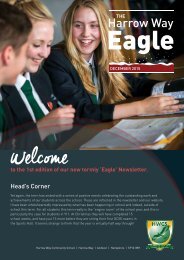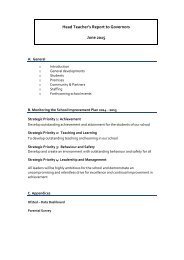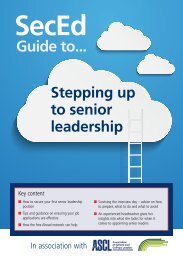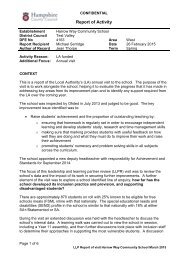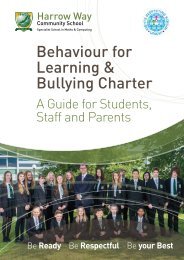Kingsbury High
- No tags were found...
You also want an ePaper? Increase the reach of your titles
YUMPU automatically turns print PDFs into web optimized ePapers that Google loves.
Effective teaching at<br />
<strong>Kingsbury</strong> <strong>High</strong><br />
Meeting and exemplifying<br />
our expectations<br />
2013
Having already decided to focus on a ‘comment only marking’ approach<br />
to our own lessons, the aim of this document is to identify specific<br />
classroom practices that we agree are desirable strategies to help<br />
teachers to meet and exemplify the <strong>Kingsbury</strong> <strong>High</strong> School effective<br />
lesson expectations. Our belief that there are many ways of delivering<br />
effective lessons at <strong>Kingsbury</strong> <strong>High</strong> School means that there are no<br />
prescribed approaches in this booklet.<br />
In order to achieve this, teaching staff worked in faculty groups to brainstorm what 10 different types of<br />
lessons and teaching approaches may look like if they meet or exemplify our lesson expectations. That<br />
activity and this booklet aim to support our efforts to meet or exemplify these expectations through the<br />
sharing of our expertise.<br />
Thus this document contains exactly one hundred specific, classroom orientated strategies to support<br />
colleagues in meeting and exemplifying our lesson expectations, drawn from the INSET session and<br />
other TLC key resources.<br />
It’s worth knowing that there are ten tips for each lesson type, but each time the first six will support<br />
the meeting of our lesson expectations and the final four will help them to be exemplified. Tips in a bold<br />
font are ones which relate to <strong>Kingsbury</strong> <strong>High</strong>’s Teaching for Learning priority focus areas.<br />
Contents<br />
The <strong>Kingsbury</strong> Expectations for Effective Lessons<br />
Top ten classroom-based tips for 10 key lesson types<br />
2<br />
1. Independent work<br />
2. Question and answer sessions<br />
3. Group work and pair work<br />
4. Revision activities<br />
5. Practical work<br />
6. Plenaries<br />
7. Teacher talks or demonstrations<br />
8. Active learning<br />
9. Whole class discussions and debates<br />
10. Feedback sessions
The <strong>Kingsbury</strong> Expectations for<br />
Effective Lessons<br />
We believe there are many ways of delivering effective lessons<br />
at <strong>Kingsbury</strong> <strong>High</strong> School.<br />
Most important is that our students love learning and make progress.<br />
Our effective KHS lessons will include assessment for learning; high expectations of behaviour;<br />
challenging, differentiated teaching; and students who are engaged and motivated.<br />
Top ten classroom-based tips for 10 key lesson types<br />
1. Independent work<br />
• Create routines and strong boundaries<br />
• Be clear about what each student can do, make sure that the independent work you ask<br />
them to do is well matched to their needs and celebrate their success<br />
• Use models, including previous students’ work as examples of success to make<br />
independent work tangible<br />
• Regularly remind students of what your expectations are through the learning objectives and<br />
success criteria and give them constructive feedback wherever possible<br />
• Sustain lesson pace<br />
• Use plenaries to gauge progress and remember to use what you’ve found out to inform<br />
your planning<br />
+ Bear in mind that the most able students need more challenging independent tasks,<br />
rather than more of the same<br />
+ Be flexible as a teacher – adjust the time and demands of independent work as the lesson is<br />
going on<br />
+ Equip your students with the skills they need to work independently – for instance ‘learn to<br />
learn’ strategies, research skills or how to use the ten step writing sequence for literacy<br />
+ Give opportunities for your students to drive forward their own independent learning –<br />
encourage them to set the tasks for each other, feed back to you what they need next and<br />
peer and self-assess each other’s individual work<br />
3
2. Question and answer sessions<br />
• Create a classroom atmosphere which encourages students to take risks<br />
• Remember our TLC work on ‘think time’<br />
• Ask open questions<br />
• Use targeted questioning and a ‘no hands up’ policy in your classroom<br />
• Don’t allow students off the hook too easily – ask more probing questions<br />
• Use questioning both to systematically check understanding and to push learning forward<br />
+ Use whole class response systems to find out what the whole class understand rather than<br />
just a few<br />
+ Be flexible – adjust your lesson depending on what you find out in the Q+A session –<br />
if the understanding is definitely there – move on even if you hadn’t planned to, if the<br />
understanding isn’t there – don’t!<br />
+ Prepare questions you will need to ask to check understanding in advance<br />
+ Encourage students to ask questions and lead the Q+A rather than simply being the responders<br />
3. Group work and pair work<br />
• Bear in mind that pupils will need support and practise to work together – great group work won’t<br />
happen overnight<br />
• Design your tasks carefully so that working together is effective and efficient, otherwise some pupils<br />
will try to work on their own, or not at all<br />
• Work as a team with any classroom support – could a TA or LSA encourage lower achieving<br />
students who may be in danger of contributing less?<br />
• Use data and AfL to create differentiated groups within your class and be flexible about who is<br />
in each group<br />
• Introduce an element of competition across groups, but remember that over-use of this could focus<br />
learners on the competition rather than succeeding in their learning<br />
• Motivate students by giving each group member a role and a focus which means it’s essential that<br />
they complete their task<br />
+ Foster an environment where group work is a safe forum to share ideas and where students are<br />
motivated and drive forward the success of their group<br />
+ Ensure students give each other constructive feedback on their group work skills<br />
+ Develop effective student-student relationships to enable effective group conversations<br />
+ Use group work to develop leadership skills<br />
4
4. Revision activities<br />
• Vary your revision approach to take account of the needs of your students<br />
• Provide revision plans which outline tasks to do each day<br />
• Give students control over their revision – ask students to traffic light topics according to<br />
their level of need, for instance<br />
• Make revision active, varied, fun or even whacky – this makes it more memorable!<br />
• Use lots of AfL strategies to check that what students are spending precious time on is<br />
what they really need<br />
• Explicitly teach techniques and strategies which aid memory<br />
+ Explicitly focus on the literacy needs of exams and controlled assessments<br />
+ Continually encourage students towards independence whatever they are working on –<br />
teach them how to plan for themselves, for instance, so that when they are alone in an exam,<br />
they are confident<br />
+ Use TLC strategies such as using mini whiteboards to see test answers immediately rather<br />
than marking work later – this means students get instant feedback<br />
+ Teach students explicit strategies to plan, monitor and evaluate their own revision at home,<br />
and give them opportunities to use them first with support and later independently<br />
5. Practical work<br />
• Use practical work to support theory and make the links between theory and practice explicit<br />
• Make sure practicals are enquiry-based<br />
• Remember that practicals still need to be differentiated according to the need of students<br />
• Teach students the skills to collect data systematically, analysing and interpreting data and<br />
evaluating methods<br />
• Engage students in a consideration of the validity and reliability of their evidence<br />
• Ensure students all have different roles when carrying out practicals in teams<br />
+ Encourage students to ask questions and make predictions before practicals<br />
+ Develop students’ opportunities for decision making<br />
+ Remember that practical work can be a great way of exposing students to the ‘messiness’ of<br />
the real world – and one where ideas can be challenged through a ‘brains-on’ accompanying<br />
‘hands-on’ experience<br />
+ Equip the students with explicit literacy strategies to support their writing up of practicals –<br />
use the 10 step writing sequence for instance<br />
5
6. Plenaries and mini-plenaries<br />
• Use plenaries to assess progress against the learning objectives and success criteria –<br />
this will allow you to personalise planning and teaching<br />
• Ask the students regularly about how the learning experience was for them<br />
• Be reflective about your lessons: what can you improve?<br />
• Teach students explicit strategies to plan, monitor and evaluate their learning<br />
• Remember to celebrate success<br />
• Understand the data on your class and use this to help inform your judgement on their<br />
progress rates in plenaries<br />
+ Respond to pupil knowledge as demonstrated during mini plenaries. If it is clear they have<br />
already grasped the learning, change or amend on the spot<br />
+ Be prepared for when students struggle with a concept or need further help – have additional<br />
activities up your sleeve to handle any situations which arise<br />
+ Remember all the good practice plenary TLC ideas which are now in the T for L manual<br />
+ Use the plenary to make skills and learning relevant and transferrable to other subjects<br />
7. Teacher talks or demonstrations<br />
• Remember to write well, students need to talk well and during teacher talk sessions you are<br />
modelling the ability to write, speak and think in academic language<br />
• Make sure that you expand students’ vocabulary generally through your talk, rather than just<br />
focusing on subject specific language<br />
• Know what the students know when planning your explanations<br />
• Use patterns of subject specific vocabulary repeatedly<br />
• Use modelling to make thought processes, approaches and writing expectations more explicit<br />
• Engage students’ hearts and minds while being wary of a style over substance approach<br />
+ Paint the picture: use analogies, metaphors and images, making abstract concepts concrete<br />
and real<br />
+ Check understanding with targeted, differentiated questions, using a no hands up approach.<br />
Make sure that questions ask students to either CLARIFY (“What did I/youmean by…?”)<br />
PROBE (“Can you tell me more about…?” or EVALUATE (“What is better about…?”) what you<br />
have been talking about<br />
+ Check understanding with whole class response systems such as mini-whiteboards,<br />
ABCD cards, hinge questions<br />
+ …and repeat; give effective explanations but then revisit the core message with spaced repetition,<br />
otherwise there is a danger that students will forget it<br />
6
8. Active learning<br />
• Use lots of mini plenaries (ABCD cards, mini whiteboards, traffic light cards) to check learning<br />
is on track<br />
• Vary your teaching strategies and styles<br />
• Avoid locking students in to a particular learning style as labelling students as a particular kind of<br />
learner can undermine their belief that success is linked to effort<br />
• Make sure there is a student driven, problem solving approach to your active learning<br />
• Develop thinking skills<br />
• Include everyone – don’t allow ‘passengers’ in your lesson<br />
+ Get students to act as teachers to leave you free to ‘observe’ learning<br />
+ Encourage students to take responsibility for identifying how they can succeed in their own<br />
learning and develop their own successful strategies and approaches to active learning<br />
+ Show flexibility and change your active learning task if it’s not working<br />
+ Differentiate your active learning to meet the needs across your class: try varying groups,<br />
activities, resources to support this<br />
9. Whole class discussions/debates<br />
• Use the 4Cs approach to developing students’ oracy: are they confident, clear,<br />
correct and continuous?<br />
• Make sure you have a good motion: this will be straightforward, accessible and will allow for<br />
debate on both sides<br />
• Make sure students have frequent feedback on their talk and opportunities to reflect<br />
on feedback<br />
• Ensure that students can react/respond to feedback<br />
• Model good practice and use exemplars of effective discussions<br />
• Link student talk to student writing and therefore aim for academic language to be used<br />
+ Remember that by debating, students are developing critical thinking, research and<br />
prioritising skills<br />
+ Scaffold the skills needed to debate<br />
+ Use self and peer assessment of students’ talk first, then teacher comments related to<br />
improving the quality of that evaluation<br />
+ Use different roles to ensure that the whole class discussion can be well differentiated and to<br />
ensure every child has a role and will be involved<br />
7
10. Feedback sessions<br />
• Be specific, accurate and clear (e.g. ‘It was good because you…’)<br />
• Give both positives and constructive targets<br />
• Make sure students can read your writing and understand what you want them to do<br />
• Allow time in lessons for students to reflect and respond to your feedback<br />
• Don’t overload students with lots of advice – try to focus on the one thing that will make the<br />
biggest difference to them<br />
• Use self and peer assessment as key parts of the feedback process<br />
+ Get the balance right between support and challenge –ask questions or ask students to look<br />
at highlighted sections and work out what they have done wrong<br />
+ Look for evidence that students are meeting developmental targets you have set previously<br />
rather than just setting new ones each time<br />
+ Track back through previous developmental targets you’ve given and check that you aren’t<br />
always setting exactly the same ones – if so, the student isn’t progressing<br />
+ Compare what a learner is doing right now with what they have done less well, or wrong,<br />
before (e.g. ‘I can see you were focusing on improving X as it is much better than<br />
last time’s Y’)<br />
<strong>Kingsbury</strong> <strong>High</strong> School<br />
Princes Avenue, <strong>Kingsbury</strong> NW9 9JR<br />
0208 206 3000<br />
www.kingsburyhigh.org.uk<br />
Headteacher: Jeremy Waxman OBE Autumn 2013<br />
This booklet was inspired by an<br />
INSET morning with the staff of<br />
<strong>Kingsbury</strong> <strong>High</strong> School in March 2013,<br />
and by a similar enterprise kindly shared<br />
by Canons <strong>High</strong> School.


